Beyond the Headlines
Beyond the Headlines is a weekly current affairs show that aims to make public policy discussions more accessible to you. We take you beyond the headlines of our daily news, bringing you access to current leaders through in-depth interviews. Produced by Master’s Students at the University of Toronto’s Munk School of Global Affairs and Public Policy.
Episodes
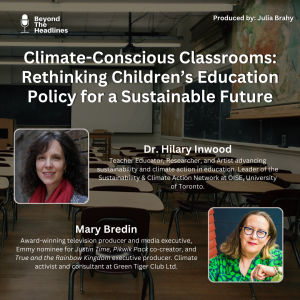
Monday Feb 03, 2025
Monday Feb 03, 2025
As the climate crisis intensifies, the need for comprehensive climate education in schools has never been more urgent. However, in Canada, climate awareness and sustainability are not consistently integrated into the national curriculum. Where climate change is addressed, it is often confined to science classrooms, leaving gaps in students' understanding of the social, ethical, and policy dimensions of the crisis. A truly modernized education system must embed environmental responsibility across subjects, ensuring that students grow up not only informed but also empowered to take meaningful action. Without institutional support, educators often struggle to incorporate sustainability into their lessons, leading to patchy, inconsistent learning experiences for students.
Beyond the classroom, children's media plays a crucial role in shaping young minds, as storytelling has the power to foster a sense of connection to the natural world, making environmental responsibility feel both urgent and personal. By examining the intersection of education, policy, and storytelling, this conversation highlights what is needed to ensure that the next generation is prepared to confront the climate crisis head-on. This episode of Beyond the Headlines will explore how education policy and media can work together to create a generation of environmentally literate citizens, featuring insights from this week's special guests.
A dedicated teacher, educator, researcher, and artist, Dr. Hilary Inwood leads the Sustainability & Climate Action Network at the Ontario Institute for Studies in Education (OISE) at the University of Toronto. Her work centers on the critical role of education in addressing the climate crisis. Through her graduate courses on environmental and sustainability education, and her coordination of large-scale collaborations between OISE and the Toronto District School Board, Dr. Inwood is pioneering initiatives that empower teachers and embed transformative climate change education into the fabric of our schools.
Mary Bredin is an award-winning television producer, media executive, and lifelong climate activist with over 25 years of experience in animation and children's media. With an international background that spans roles at Canal+, Disney Channels Worldwide, and Viasat, Mary has been at the forefront of developing engaging, climate-conscious children’s programming. Her impressive portfolio includes an Emmy nomination for Justin Time, executive production for the Netflix hit True and the Rainbow Kingdom, and co-creation of Disney Junior’s Pikwik Pack. Currently a consultant at Green Tiger Club Ltd., Mary brings a unique blend of creative vision and business acumen to the challenge of using media as a tool for environmental education.
Produced by: Julia Brahy
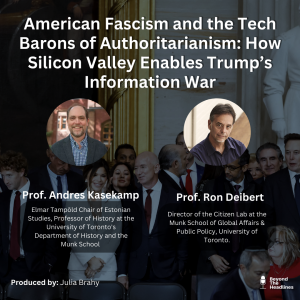
Monday Jan 27, 2025
Monday Jan 27, 2025
Tech oligarchs have risen to dominate global politics and public discourse, posing grave threats to democracy and governance. Under Donald Trump’s presidency, the consolidation of power among Silicon Valley elites has exacerbated critical challenges, including the spread of misinformation, the weaponization of social media, and the unchecked development of artificial intelligence. These forces have not only deepened political polarization but also paved the way for the normalization of extremism, undermining the foundations of truth in the digital era. The intersection of technological exploitation, political radicalization, and the information war presents urgent questions for the future of democratic societies.
In this episode of Beyond the Headlines, we unpack these critical dynamics with two distinguished guests.
Andres Kasekamp is the Elmar Tampõld Chair of Estonian Studies and Professor of History at the University of Toronto’s Department of History and the Munk School of Global Affairs and Public Policy. He is a leading scholar on Baltic politics, memory politics, and populist radical right movements. Formerly a Professor of Baltic Politics at the University of Tartu and Director of the Estonian Foreign Policy Institute in Tallinn, Kasekamp has held visiting positions at esteemed institutions such as Humboldt University in Berlin and the Norwegian Institute for International Affairs. Among his acclaimed works is A History of the Baltic States, which has been translated into multiple languages and remains a definitive text in the field. His research explores European foreign and security policy and the intricate dynamics of cooperation and conflict in the Baltic Sea region. Currently, he is editing The Oxford Handbook of Modern Baltic History.
Ron Deibert is a Professor of Political Science and the Director of the Citizen Lab at the Munk School of Global Affairs & Public Policy, University of Toronto. A pioneer in cybersecurity and human rights, Deibert has led the Citizen Lab’s groundbreaking investigations into cyber espionage, commercial spyware, and digital censorship, producing over 120 influential reports. These include the Tracking Ghostnet investigation into cyber-espionage and the Reckless series, which revealed spyware abuses targeting journalists and activists. Deibert is also the author of RESET: Reclaiming the Internet for Civil Society, a winner of the Shaughnessy Cohen Prize for Political Writing. His work has earned numerous accolades, including the Electronic Frontier Foundation Pioneer Award and the Order of Ontario. Beyond academia, he serves on advisory boards for organizations like Amnesty International and PEN Canada, making him a critical voice in addressing the intersection of technology, democracy, and civil liberties.
Produced by: Julia Brahy
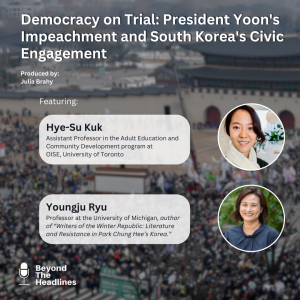
Monday Jan 20, 2025
Monday Jan 20, 2025
South Korea finds itself at a critical turning point as President Yoon Suk-yeol's impeachment exposes deep challenges to its democratic framework. Allegations of misconduct and debates over the potential use of martial law highlight the fragility of democratic accountability and the lasting influence of authoritarian legacies. At the same time, the country’s history of transformative grassroots activism, including the Candlelight Protests, underscores the vital role of civic engagement in shaping South Korea’s political landscape.
In this episode, we delve into South Korea's political turmoil with Professor Hye-Su Kuk and Professor Youngju Ryu, where we shall examine the intersection of state power, citizen activism, and the institutions designed to uphold democratic norms. By reflecting on the nation’s struggle for democracy from the 1960s to the present, we explore the lessons its past offers for overcoming modern challenges and safeguarding the integrity of its political future.
Hye-Su Kuk is an Assistant Professor in the Adult Education and Community Development program at OISE/UT and affiliated with the Centre for the Study of Korea at the University of Toronto. Her research focuses on the dynamic relationship between education, social movements, and democracy, particularly in South Korea’s post-1987 democratization era. Dr. Kuk’s work emphasizes the power of grassroots activism and nonformal education in fostering participatory democracy and driving social change. Her publications include a systematic review of social movement learning and a groundbreaking project on "enunciatory learning," a concept she developed to highlight the lived experiences of activist-educators navigating neoliberal and postcolonial challenges. Drawing on her expertise in institutional ethnography, she examines how education can challenge entrenched power structures and empower citizens as active participants in democratic processes.
Youngju Ryu is a leading scholar in modern Korean literature, whose research explores the intersections of politics, protest, and cultural expression in South Korea. Her award-winning book, Writers of the Winter Republic: Literature and Resistance in Park Chung Hee’s Korea, examines how Korean writers of the 1970s used literature as a tool of resistance against authoritarianism, earning recognition as one of Foreign Affairs’ "Best Books of 2016." In addition to her acclaimed work on literature and resistance, Professor Ryu co-edited Cultures of Yusin: South Korea in the 1970s and contributes to the Perspectives on Contemporary Korea series. Her current research reexamines South Korea’s democratization movement from the 1960s to 2010s through the lens of media and public discourse, exploring how formats such as podcasts shape political engagement. Professor Ryu’s scholarship bridges literary criticism, cultural history, and political analysis, offering deep insights into the forces that have shaped South Korea’s democratic evolution. Through her work, she illuminates the enduring significance of cultural and civic activism in preserving democratic values.
Produced by: Julia Brahy

Monday Jan 13, 2025
Monday Jan 13, 2025
The Gaza war has triggered widespread geopolitical repercussions, placing Lebanon at a critical juncture. Regional instability has intensified, exacerbating tensions between Hezbollah and Israel despite a recently brokered ceasefire. Israel’s continued military presence in southern Lebanon raises urgent questions about sovereignty, security, and the viability of peace agreements in this volatile region.
Lebanon faces mounting challenges, including economic collapse, public unrest, and increased militarization along its southern border. Hezbollah’s response to the Gaza conflict, intertwined with its ties to Iran, complicates Lebanon’s internal dynamics and its role within Middle Eastern geopolitics. Meanwhile, the international community grapples with balancing Lebanon’s fragile stability against the humanitarian crisis in Gaza, often prioritizing strategic interests over humanitarian needs.
This episode examines the historical, political, and humanitarian dimensions of these issues. What is Lebanon’s path forward amidst regional and domestic pressures? How does Hezbollah influence this complex landscape, and what role can international actors play in fostering peace? Joining us to unravel these questions are this week's special guests.
Jon Allen is a distinguished Canadian diplomat with over four decades of experience in international affairs. A graduate of the University of Western Ontario (LL.B.) and the London School of Economics (LL.M. in International Law), Mr. Allen has held key postings worldwide, including Mexico City, New Delhi, and Washington, D.C., where he served as Minister of Political Affairs. From 2006 to 2010, he was Canada’s Ambassador to Israel, gaining deep insight into the region’s geopolitics. Currently, Mr. Allen is a Senior Fellow at the Munk School of Global Affairs, a Distinguished Fellow of the Canadian International Council, and Chair of Rozana Canada, promoting Israeli-Palestinian healthcare collaboration. He previously appeared on Beyond the Headlines in the 2023/24 season to discuss insurgency dynamics in the Middle East.
Eugene Rogan is a renowned historian specializing in the modern Middle East and North Africa. He serves as Professor of Modern Middle Eastern History at the University of Oxford and is a Fellow at St. Antony’s College. A Columbia University economics graduate, Dr. Rogan earned his master’s and doctorate in Middle Eastern Studies from Harvard University. Professor Rogan’s acclaimed works include The Arabs: A History, The Fall of the Ottomans: The Great War in the Middle East, and the forthcoming The Damascus Events: The 1860 Massacre and the Destruction of the Old Ottoman World. His expertise spans the Arab-Israeli conflict, Ottoman history, and the First World War’s impact on the region, offering valuable historical context to contemporary events. We are honored to have him join us today.
Production NoteThe segment featuring Jon Allen was recorded on November 11, 2024, before key developments in the Israel-Lebanon conflict. A ceasefire between Hezbollah and Israel was reached in late November 2024; however, Israeli forces remain in southern Lebanon, raising ongoing concerns. These updates are addressed in the second segment with Professor Eugene Rogan, recorded on January 11, 2025, to reflect the latest developments.
Produced by: Julia Brahy
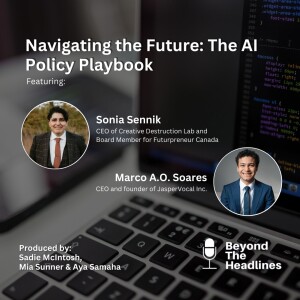
Wednesday Dec 18, 2024
Wednesday Dec 18, 2024
How can policymakers, businesses, and individuals navigate the new era of Artificial Intelligence development? What should we do to ensure the ethical and responsible use of AI systems? In which directions should regulations be moving? In this episode, we discuss how we can shape the future of AI by improving regulations to navigate and mitigate its potential risks; with the guidance of this week's special guests.
Sonia Sennik is the CEO of Creative Destruction Lab (CDL), a global seed-stage program for scalable science-based ventures operating in six countries, and a current board member for Futurpreneur Canada, an organization that provides early-stage financing, mentorship, and resources to support aspiring Canadians in launching successful businesses that contribute to sustainable economic development in their communities. With a decade at Hatch Ltd. managing large projects, Sonia founded the Sonia Sennik Resilience Fund at McMaster University, the largest multi-donor endowment in its history. Moreover, Sonia was the head coach of the Rugby Ontario Senior Women’s Team from 2016 to 2018, winning bronze, silver, and gold at the Canadian Rugby Championships.
Marco A.O. Soares is the CEO and founder of JasperVocal Inc., an Artificial Intelligence startup based in Winnipeg, Manitoba. An entrepreneur at heart, Marco is passionate about providing people with innovative services to make the world a better place. Initially the developer of a Math App, Marco shifted his focus to AI after seeing the profound impact it had on a political campaign. A strong advocate for using AI for positive change, Marco has centred his efforts on addressing critical issues such as the mental health crisis within the call centre industry. Alongside his role as CEO, Marco is pursuing his studies full-time at the Hult International Business School in London, England.
Produced by: Sadie McIntosh, Mia Sunner and Aya Samaha
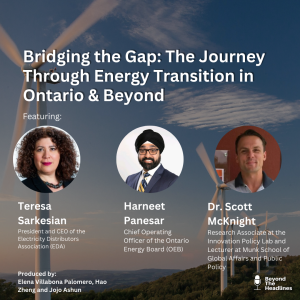
Wednesday Dec 11, 2024
Wednesday Dec 11, 2024
Energy transition has become a question of high importance throughout the world. However, these changes raise many questions about affordability, reliability, and readiness. How can we modernize the grid while balancing consumer needs with industry demands?
In this episode, we will discuss with our guests how Ontario can prepare for numerous changes and opportunities in the energy transition process while exploring key challenges and mitigations.
Teresa Sarkesian, President and CEO of the Electricity Distributors Association (EDA), and Harneet Panesar, Chief Operating Officer of the Ontario Energy Board (OEB), will share their expertise, addressing operational and regulatory challenges critical to a successful energy transition.
Dr. Scott McKnight, Post-Doctoral Fellow, Research Associate, and Lecturer at the University of Toronto, will provide insights into the geopolitics of moving away from oil and discuss how Canada can navigate the associated risks.
Tune in as we explore the future of Ontario's green energy transition in this week's episode.
Produced by: Elena Villabona Palomero, Hao Zheng, and Jojo Ashun
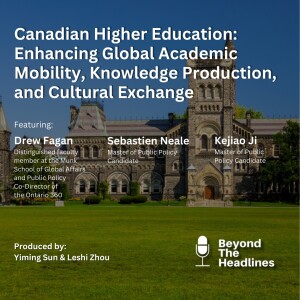
Wednesday Dec 04, 2024
Wednesday Dec 04, 2024
Canada has one of the most developed education systems in the world, while the University of Toronto has been ranked as the top university in Canada and 17th globally. Higher education obtained from one of the best universities in the world can open many doors to a promising future. In this episode, we explore how policymakers can enhance education to support cross-border learning, expand research partnerships, and foster cultural exchange.
Professor Drew Fagan is a distinguished faculty member at the Munk School of Global Affairs and Public Policy. He teaches in graduate programs and leads several key initiatives, including serving as a Co-Director of the Ontario 360 policy initiative and a Special Advisor to the Infrastructure Institute at the School of Cities. With his extensive expertise in policy and urban development, Professor Fagan offers valuable insights into the role of Canada’s higher education system in fostering academic mobility, knowledge production, and cultural exchange.
Sebastien Neale is a Master of Public Policy candidate at the Munk School of Global Affairs & Public Policy. He holds a bachelor's degree in Political Science and Economics from the University of Toronto. Born in Singapore to a French family, Sebastien offers a unique global perspective, making him well-suited to discuss the role of the University of Toronto and Canada’s higher education system in fostering academic mobility, knowledge production, and cultural exchange.
Kejiao Ji holds an Honours Bachelor of Social Science in Economics from the University of Ottawa, having transferred from Beihang University in Beijing. With internship experience at UBS and local government offices, she has developed expertise in industry research and financial analysis.
Produced by: Yiming Sun and Leshi Zhou
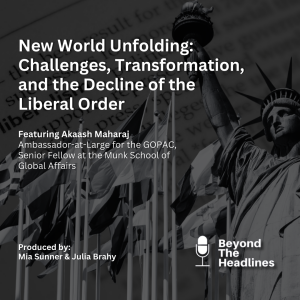
Tuesday Nov 26, 2024
Tuesday Nov 26, 2024
As the world undergoes transformative shifts, the international liberal order—once the cornerstone of global governance—is facing unprecedented challenges. Mistrust in multilateral institutions, reconfigured global supply chains, and the advent of a new digital age are reshaping the rules of engagement. In this week’s episode of Beyond the Headlines, we explore the pressing questions of whether the liberal order can endure, what alternatives might emerge, and the potential shape of a new world order. This conversation delves into the crossroads of international relations, addressing the forces redefining global dynamics and the implications for the future.
Our guest this week is Akaash Maharaj, a Senior Fellow at the Munk School of Global Affairs and Ambassador-at-Large for the Global Organization of Parliamentarians Against Corruption (GOPAC). With an academic foundation in Philosophy, Politics, and Economics from Oxford University and a career dedicated to advancing good governance and the rule of law, Akaash brings invaluable expertise to the table. From addressing the United Nations on prosecuting kleptocrats to championing anti-corruption initiatives worldwide, his insights shed light on the challenges and opportunities shaping the global order.
Tune in to Beyond the Headlines to join this thought-provoking discussion. Don’t miss this compelling episode as we uncover where we stand in the world today and what lies ahead. Available on all platforms, streaming now!
Produced by: Mia Sunner and Julia Brahy

Wednesday Nov 20, 2024
Wednesday Nov 20, 2024
The 2025 federal election comes at a critical juncture for Canada, with national conversations focusing on major challenges such as the rising cost of living, climate action, infrastructure development, and government transparency. These pressing issues are shaping the platforms of candidates and nomination contestants alike as they propose solutions to address Canadians' most urgent concerns.
Affordability remains a top priority for many voters. Across the country, rising housing costs, inflation, and stagnant wages are creating economic pressures that require immediate attention. Proposals to increase housing supply through policy reforms and interprovincial cooperation have gained traction as potential remedies to the housing crisis. Similarly, Canada’s response to climate change is a key election theme, with debates surrounding carbon taxes, investments in renewable energy, and efforts to modernize public infrastructure.
Infrastructure development is another pressing concern, as outdated systems hinder economic growth and connectivity. Calls for modernization, including the introduction of high-speed rail and improved interprovincial trade networks, reflect the need for long-term solutions to these challenges. Meanwhile, institutional transparency and accountability are under scrutiny, with Canadians demanding reforms to government systems, particularly around access to information and decision-making processes.
Amid these broader national issues, local nomination contests are determining who will represent Canadians in Parliament. In Burlington, Connor Fraser is campaigning for the Conservative Party nomination. With a professional background in engineering, finance, and public policy, Fraser has centered his platform on addressing housing affordability, economic modernization, and public safety. He has also emphasized the importance of transparency in governance and collaboration between federal and provincial governments to reduce trade barriers and strengthen economic competitiveness.
As Canadians prepare to head to the polls, the choices made at both the nomination and federal election levels will shape the nation’s path forward. These decisions will influence how Canada addresses its critical challenges and builds a future that balances sustainability, affordability, and prosperity for all.
Produced by: Julia Brahy
CIUT 89.5 FM, Toronto’s only independent, open-format radio station, is hosting its Fall Fundraising Campaign from November 18th to November 24th, 2024, with a goal of raising $100,000 to keep this vital community resource thriving. Powered by over 80 unique hosts, CIUT delivers diverse programming that reflects the heart of our city. Your support ensures this unique platform remains accessible to all—donations can be made online at www.ciut.fm or by calling 416-946-7800 (local) or 1-888-204-8976 (toll-free). Contributions of $89.50 or more grant membership, while a $500 donation lets you host a two-hour music show; all donors receive a retro glow-in-the-dark t-shirt as a token of appreciation.
Help us keep The Sound of Your City alive!
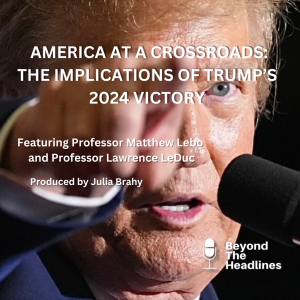
Tuesday Nov 12, 2024
Tuesday Nov 12, 2024
The re-election of Donald Trump in the 2024 U.S. presidential election marks a pivotal moment in American politics, raising critical questions about the future of democracy, social policy, and international relations. With a strong conservative base and renewed Republican control in Congress, Trump's second term is likely to bring significant shifts to key areas such as reproductive rights, civil liberties, and the role of federal institutions.
This election has underscored deepening divides across American society, with shifting support among white male, white female, and Latino voters signaling evolving priorities and a complex response to Trump's policies. Additionally, his victory has implications that extend beyond U.S. borders, potentially reshaping America's commitments to allies and its positions on conflicts such as Ukraine and Israel-Gaza. In today’s episode, we explore both the domestic and international implications of a second Trump presidency with this week’s special guests.
Joining us first is Professor Matthew Lebo, a distinguished scholar in political science from the University of Western Ontario, where he co-directs the Centre for Computational and Quantitative Social Science. Professor Lebo's expertise lies in political methodology and American politics, with a focus on national institutions, political behavior, parties, and public opinion. Professor Lebo is the author of Strategic Party Government: Why Winning Trumps Ideology (2017), and his upcoming book, A Practical Guide to Time Series, will be published by Cambridge University Press in 2025. His work has been featured in over 35 top political science journals, including the American Journal of Political Science and the Journal of Politics. Professor Lebo has also held notable roles as department chair both at Western and SUNY-Stony Brook, where he founded the Center for Behavioural Political Economy. Throughout his career, he has held prestigious appointments, including a postdoctoral fellowship at Harvard, an Academic Visitor role at Oxford, and Visiting Professor positions at the University of Toronto and, currently, McGill University.
Our second guest this week is Professor Lawrence LeDuc, Professor Emeritus of Political Science at the University of Toronto. Professor LeDuc's work has made an influential mark in the fields of Canadian and comparative political behavior, with a special focus on political parties, elections, and research methods. Among his published works are key titles such as Absent Mandate: Strategies and Choices in Canadian Elections (2019), Comparing Democracies: Elections and Voting in a Changing World (2014), and Dynasties and Interludes: Past and Present in Canadian Electoral Politics (2016). His research has also appeared in respected journals, including Electoral Studies, Party Politics, and the American Political Science Review. In recognition of his contributions, Professor LeDuc was awarded the Mildred A. Schwartz Lifetime Achievement Award in Canadian Politics by the American Political Science Association in 2015.
Produced by: Julia Brahy








